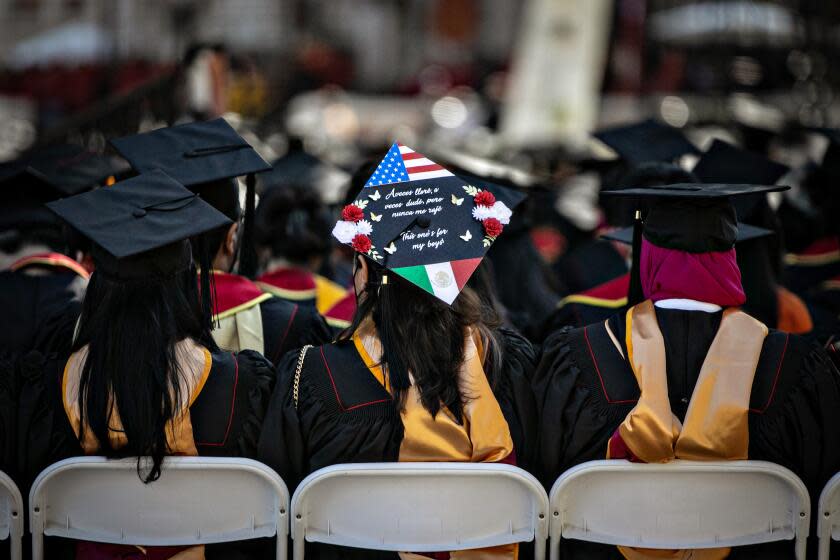Editorial: The demise of liberal arts? Students lose when colleges trade humanities for STEM

Socrates would weep. The great philosopher of ancient Athens was among the first teachers of critical thinking, you might say, and he died for doing so. And now, college philosophy departments — along with the other humanities and the social sciences — are shrinking, with reduced fields of study, smaller teaching staffs and fewer courses.
Part of this shrinkage in many big universities and smaller colleges as well is the result of rising concerns about the cost of a college degree, which can leave graduates and parents in serious debt for years or decades.
Read more: Editorial: Too much heated rhetoric on campus. Bring informed debate back to universities
Students understandably want to feel that their investment of time and money will pay off in the not-too-far future. A STEM degree — science, tech, engineering and math — often opens up more and better-paid career opportunities than those in other majors. As a result, fewer students are signing up for non-STEM majors and courses, and colleges, already wondering how they’ll survive declines in enrollment, are in turn shrinking those departments.
University humanities and social sciences departments also have been demonized by the far right as hotbeds of "wokeism," fuzzy thinking and rampant liberalism, where some conservative students and professors say they're made to feel unwelcome when they are not taking a progressive stance.
Read more: Editorial: A welcome revolt against the flawed college ranking system
In North Carolina, the Legislature passed a budget this year that provides funding for new distinguished professorships only in STEM fields at the state's public universities.
Apparently, the legislators also don’t care whether the state produces top-notch urban planners, crime solvers, social workers, psychologists and language translators, all of which fall within social sciences. It’s a pound-foolish mistake as the colleges' reputations are likely to slide, making it harder to attract top students or faculty unless the schools can come up with their own money for the high-level professorships.
Read more: Opinion: The American university system is reviled at home but envied around the world. Why?
There’s nothing wrong with supporting STEM majors, which provide a path to well-paid, meaningful and fulfilling jobs. But universities were never meant to be merely career-prep schools. They also teach — or should teach — students how to think deeply and critically, analyze smartly, bring people together collaboratively, communicate articulately, as well as innovate and create. All of these traits are at the heart of humanities and social science studies.
They also happen to be traits highly valued by employers. According to a 2013 survey, more than 90% of employers agree that “demonstrated capacity to think critically, communicate clearly, and solve complex problems is more important” than an applicant’s college major, and that ethical judgment, integrity, intercultural skills and the ability to continue learning also were key. Similar surveys a few years later showed the same: Employers were looking for workers who were great communicators and possessed "soft" skills such as critical thinking.
Read more: Opinion: I'm co-teaching my college class with ChatGPT. Will it upstage me?
If a good future awaits people with these abilities, why are the non-STEM fields often viewed as career dead ends? This is where colleges have let their students down. Employers are looking for demonstrated capacity, which means they want applicants who have shown these abilities outside the classroom, in some mix of experience with campus organizations, volunteer gigs, internships and paid work. Relatively few colleges do a good job of providing students with those opportunities or guidance in how their studies might translate into rewarding careers.
Colleges that want the liberal arts to continue as robust fields of study need to reconsider the status quo. They should slim down tuition costs and ensure that students graduate with strong skills in critical and innovative thinking and in working with others. Those are abilities that are highly valued by employers in many different industries.
At the same time, right-wing politicians (and left-wing, for that matter) should be keeping their fingers out of how universities run their academic programs. They aren’t experts, and their attempts to control colleges arise from personal biases and political interests rather than from sound academic thinking. It seldom comes to good.
Socrates was convicted of impiety and corrupting the youths of Athens, and sentenced to drink poison hemlock. Daring ideas taught by great thinkers have long felt like a threat to petty minds.
This story originally appeared in Los Angeles Times.

